Professional Ethics: Breaches in Nurses' Code of Conduct Report
VerifiedAdded on 2023/04/07
|9
|2194
|193
Report
AI Summary
This report delves into the critical importance of the nurses' code of ethics and professional practice, analyzing potential breaches through the lens of the International Council of Nurses (ICN), Nursing and Midwifery Board of Australia (NMBA), and Australian Health Practitioner Regulation Agency (AHPRA) guidelines. It examines scenarios where nurses may inadvertently compromise patient confidentiality, professional boundaries, and social media policies, emphasizing the need for strict adherence to ethical standards. The report underscores the legal and ethical obligations of healthcare professionals to safeguard patient information, maintain therapeutic relationships, and navigate the complexities of online conduct, highlighting the role of these codes in protecting both nurses and the public. The document also references past research and articles to support claims and statements about the importance of maintaining ethical standards in the field. Desklib offers a platform for students to access similar solved assignments and past papers.
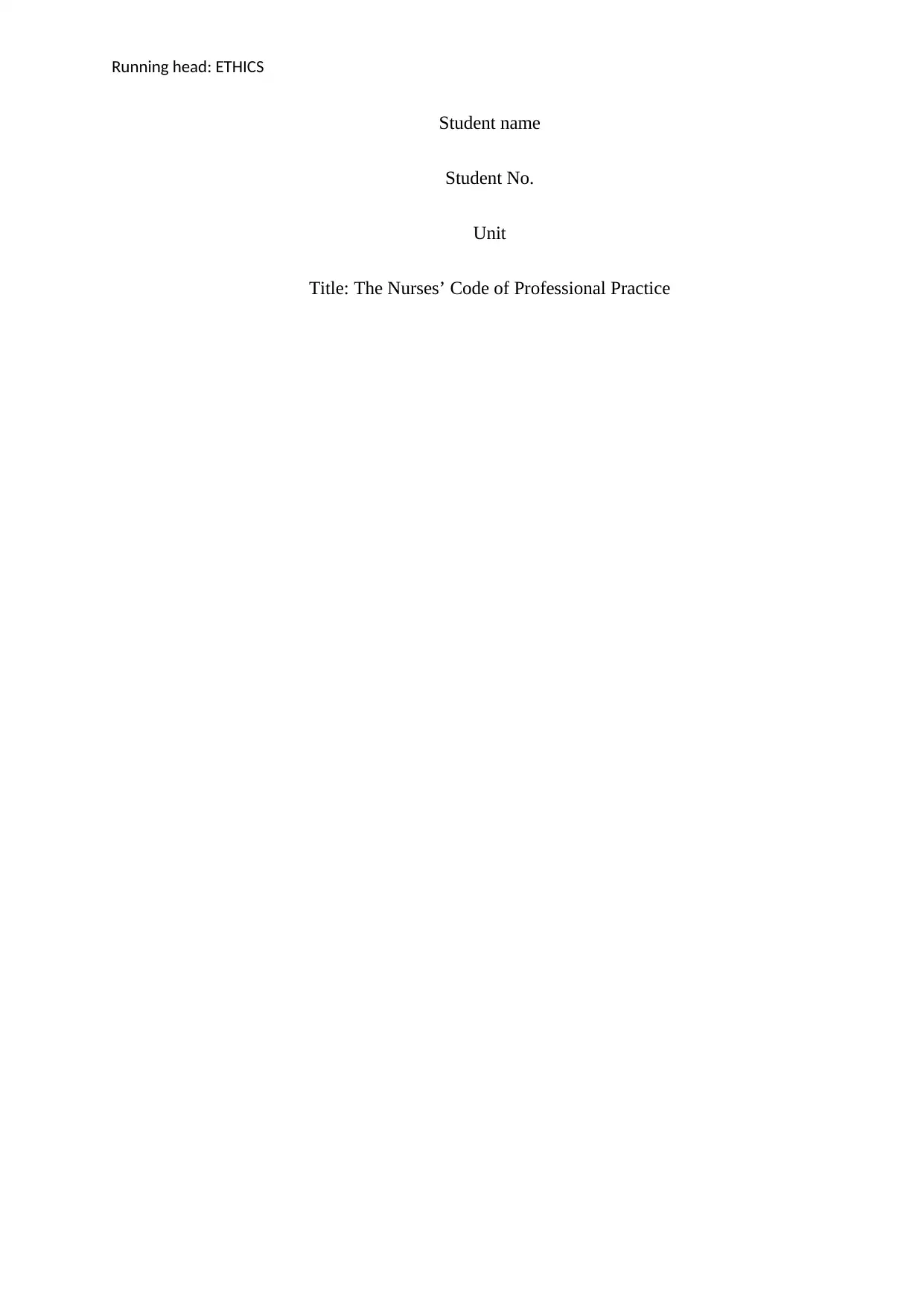
Running head: ETHICS
Student name
Student No.
Unit
Title: The Nurses’ Code of Professional Practice
Student name
Student No.
Unit
Title: The Nurses’ Code of Professional Practice
Paraphrase This Document
Need a fresh take? Get an instant paraphrase of this document with our AI Paraphraser
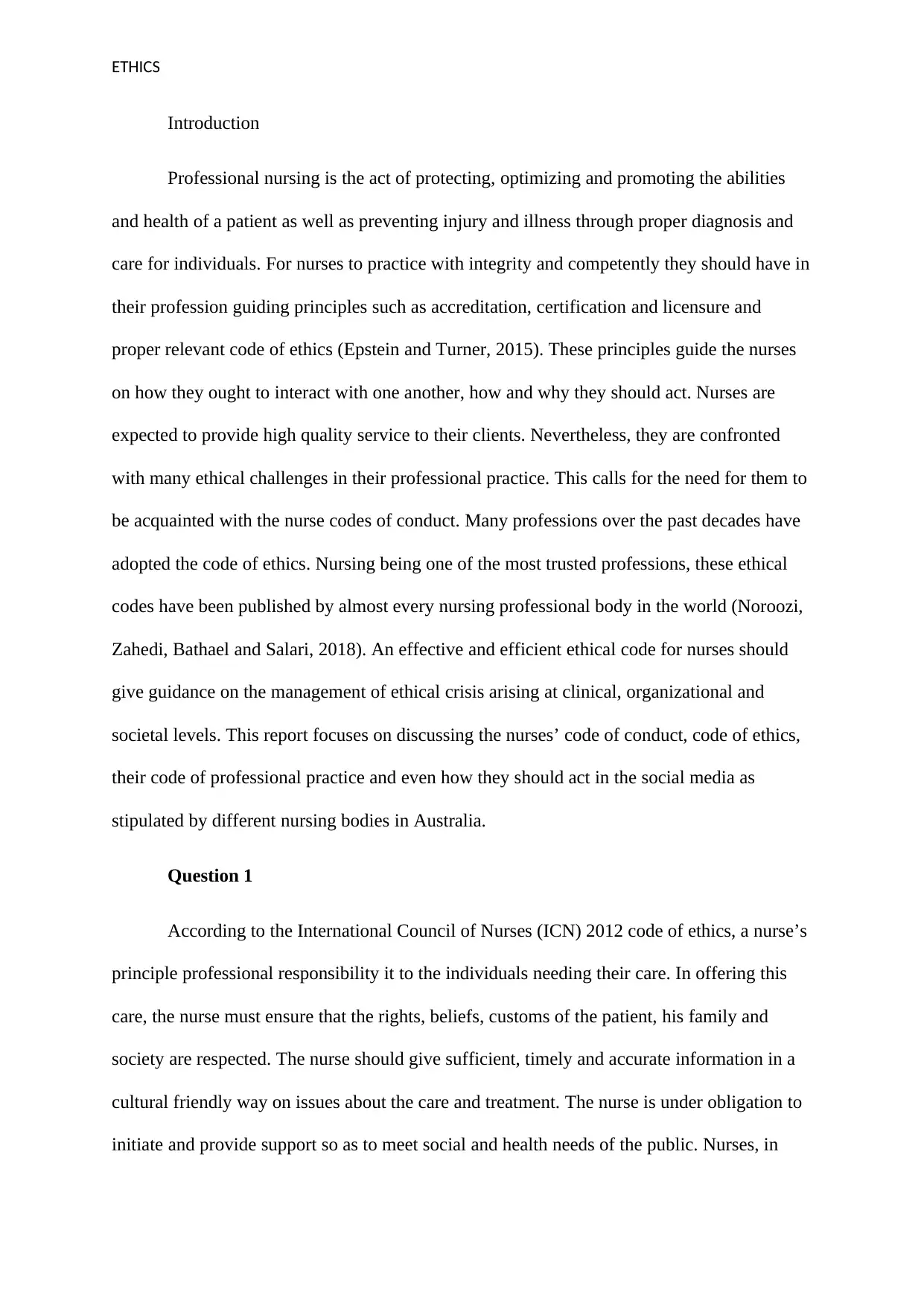
ETHICS
Introduction
Professional nursing is the act of protecting, optimizing and promoting the abilities
and health of a patient as well as preventing injury and illness through proper diagnosis and
care for individuals. For nurses to practice with integrity and competently they should have in
their profession guiding principles such as accreditation, certification and licensure and
proper relevant code of ethics (Epstein and Turner, 2015). These principles guide the nurses
on how they ought to interact with one another, how and why they should act. Nurses are
expected to provide high quality service to their clients. Nevertheless, they are confronted
with many ethical challenges in their professional practice. This calls for the need for them to
be acquainted with the nurse codes of conduct. Many professions over the past decades have
adopted the code of ethics. Nursing being one of the most trusted professions, these ethical
codes have been published by almost every nursing professional body in the world (Noroozi,
Zahedi, Bathael and Salari, 2018). An effective and efficient ethical code for nurses should
give guidance on the management of ethical crisis arising at clinical, organizational and
societal levels. This report focuses on discussing the nurses’ code of conduct, code of ethics,
their code of professional practice and even how they should act in the social media as
stipulated by different nursing bodies in Australia.
Question 1
According to the International Council of Nurses (ICN) 2012 code of ethics, a nurse’s
principle professional responsibility it to the individuals needing their care. In offering this
care, the nurse must ensure that the rights, beliefs, customs of the patient, his family and
society are respected. The nurse should give sufficient, timely and accurate information in a
cultural friendly way on issues about the care and treatment. The nurse is under obligation to
initiate and provide support so as to meet social and health needs of the public. Nurses, in
Introduction
Professional nursing is the act of protecting, optimizing and promoting the abilities
and health of a patient as well as preventing injury and illness through proper diagnosis and
care for individuals. For nurses to practice with integrity and competently they should have in
their profession guiding principles such as accreditation, certification and licensure and
proper relevant code of ethics (Epstein and Turner, 2015). These principles guide the nurses
on how they ought to interact with one another, how and why they should act. Nurses are
expected to provide high quality service to their clients. Nevertheless, they are confronted
with many ethical challenges in their professional practice. This calls for the need for them to
be acquainted with the nurse codes of conduct. Many professions over the past decades have
adopted the code of ethics. Nursing being one of the most trusted professions, these ethical
codes have been published by almost every nursing professional body in the world (Noroozi,
Zahedi, Bathael and Salari, 2018). An effective and efficient ethical code for nurses should
give guidance on the management of ethical crisis arising at clinical, organizational and
societal levels. This report focuses on discussing the nurses’ code of conduct, code of ethics,
their code of professional practice and even how they should act in the social media as
stipulated by different nursing bodies in Australia.
Question 1
According to the International Council of Nurses (ICN) 2012 code of ethics, a nurse’s
principle professional responsibility it to the individuals needing their care. In offering this
care, the nurse must ensure that the rights, beliefs, customs of the patient, his family and
society are respected. The nurse should give sufficient, timely and accurate information in a
cultural friendly way on issues about the care and treatment. The nurse is under obligation to
initiate and provide support so as to meet social and health needs of the public. Nurses, in
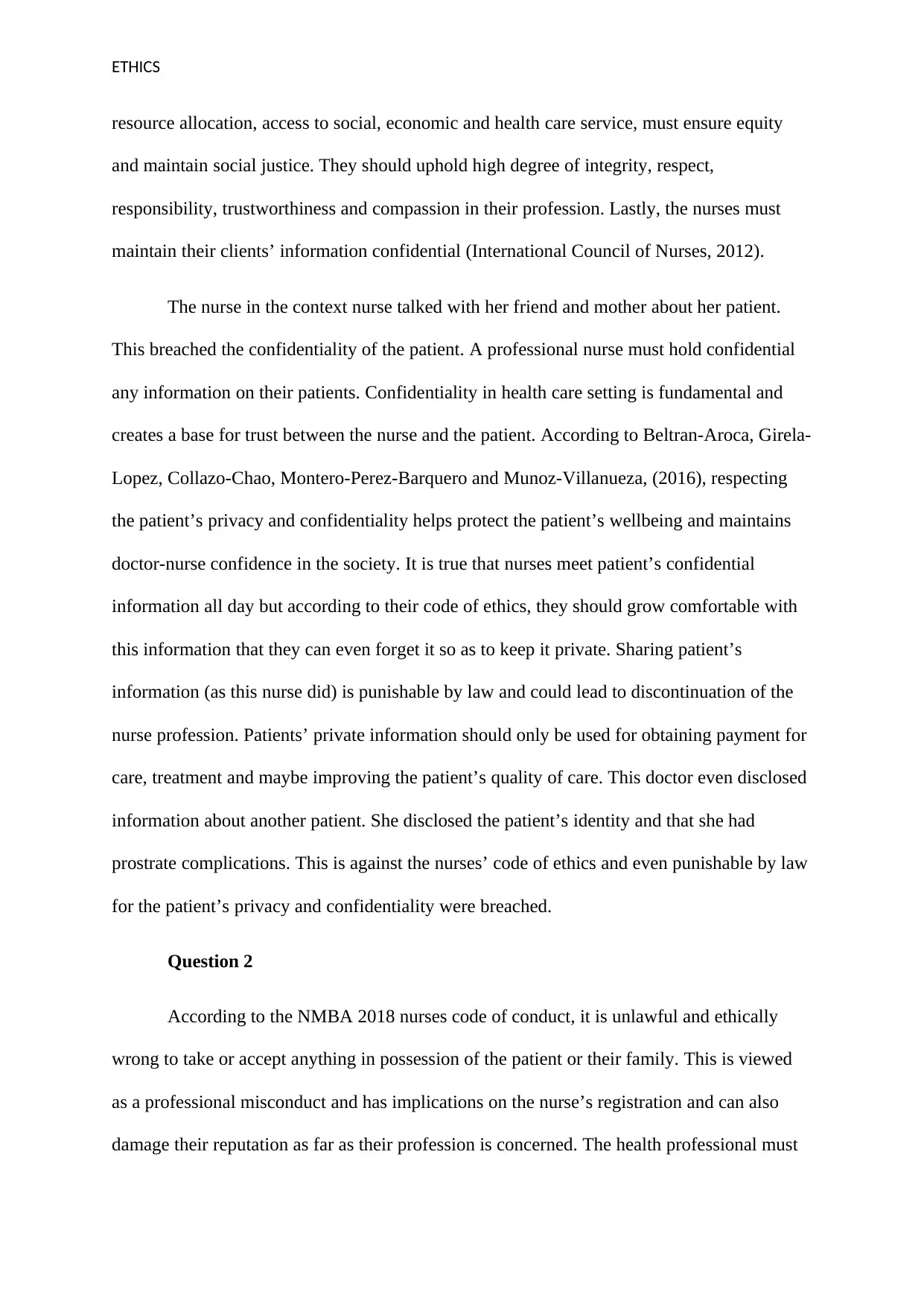
ETHICS
resource allocation, access to social, economic and health care service, must ensure equity
and maintain social justice. They should uphold high degree of integrity, respect,
responsibility, trustworthiness and compassion in their profession. Lastly, the nurses must
maintain their clients’ information confidential (International Council of Nurses, 2012).
The nurse in the context nurse talked with her friend and mother about her patient.
This breached the confidentiality of the patient. A professional nurse must hold confidential
any information on their patients. Confidentiality in health care setting is fundamental and
creates a base for trust between the nurse and the patient. According to Beltran-Aroca, Girela-
Lopez, Collazo-Chao, Montero-Perez-Barquero and Munoz-Villanueza, (2016), respecting
the patient’s privacy and confidentiality helps protect the patient’s wellbeing and maintains
doctor-nurse confidence in the society. It is true that nurses meet patient’s confidential
information all day but according to their code of ethics, they should grow comfortable with
this information that they can even forget it so as to keep it private. Sharing patient’s
information (as this nurse did) is punishable by law and could lead to discontinuation of the
nurse profession. Patients’ private information should only be used for obtaining payment for
care, treatment and maybe improving the patient’s quality of care. This doctor even disclosed
information about another patient. She disclosed the patient’s identity and that she had
prostrate complications. This is against the nurses’ code of ethics and even punishable by law
for the patient’s privacy and confidentiality were breached.
Question 2
According to the NMBA 2018 nurses code of conduct, it is unlawful and ethically
wrong to take or accept anything in possession of the patient or their family. This is viewed
as a professional misconduct and has implications on the nurse’s registration and can also
damage their reputation as far as their profession is concerned. The health professional must
resource allocation, access to social, economic and health care service, must ensure equity
and maintain social justice. They should uphold high degree of integrity, respect,
responsibility, trustworthiness and compassion in their profession. Lastly, the nurses must
maintain their clients’ information confidential (International Council of Nurses, 2012).
The nurse in the context nurse talked with her friend and mother about her patient.
This breached the confidentiality of the patient. A professional nurse must hold confidential
any information on their patients. Confidentiality in health care setting is fundamental and
creates a base for trust between the nurse and the patient. According to Beltran-Aroca, Girela-
Lopez, Collazo-Chao, Montero-Perez-Barquero and Munoz-Villanueza, (2016), respecting
the patient’s privacy and confidentiality helps protect the patient’s wellbeing and maintains
doctor-nurse confidence in the society. It is true that nurses meet patient’s confidential
information all day but according to their code of ethics, they should grow comfortable with
this information that they can even forget it so as to keep it private. Sharing patient’s
information (as this nurse did) is punishable by law and could lead to discontinuation of the
nurse profession. Patients’ private information should only be used for obtaining payment for
care, treatment and maybe improving the patient’s quality of care. This doctor even disclosed
information about another patient. She disclosed the patient’s identity and that she had
prostrate complications. This is against the nurses’ code of ethics and even punishable by law
for the patient’s privacy and confidentiality were breached.
Question 2
According to the NMBA 2018 nurses code of conduct, it is unlawful and ethically
wrong to take or accept anything in possession of the patient or their family. This is viewed
as a professional misconduct and has implications on the nurse’s registration and can also
damage their reputation as far as their profession is concerned. The health professional must
⊘ This is a preview!⊘
Do you want full access?
Subscribe today to unlock all pages.

Trusted by 1+ million students worldwide
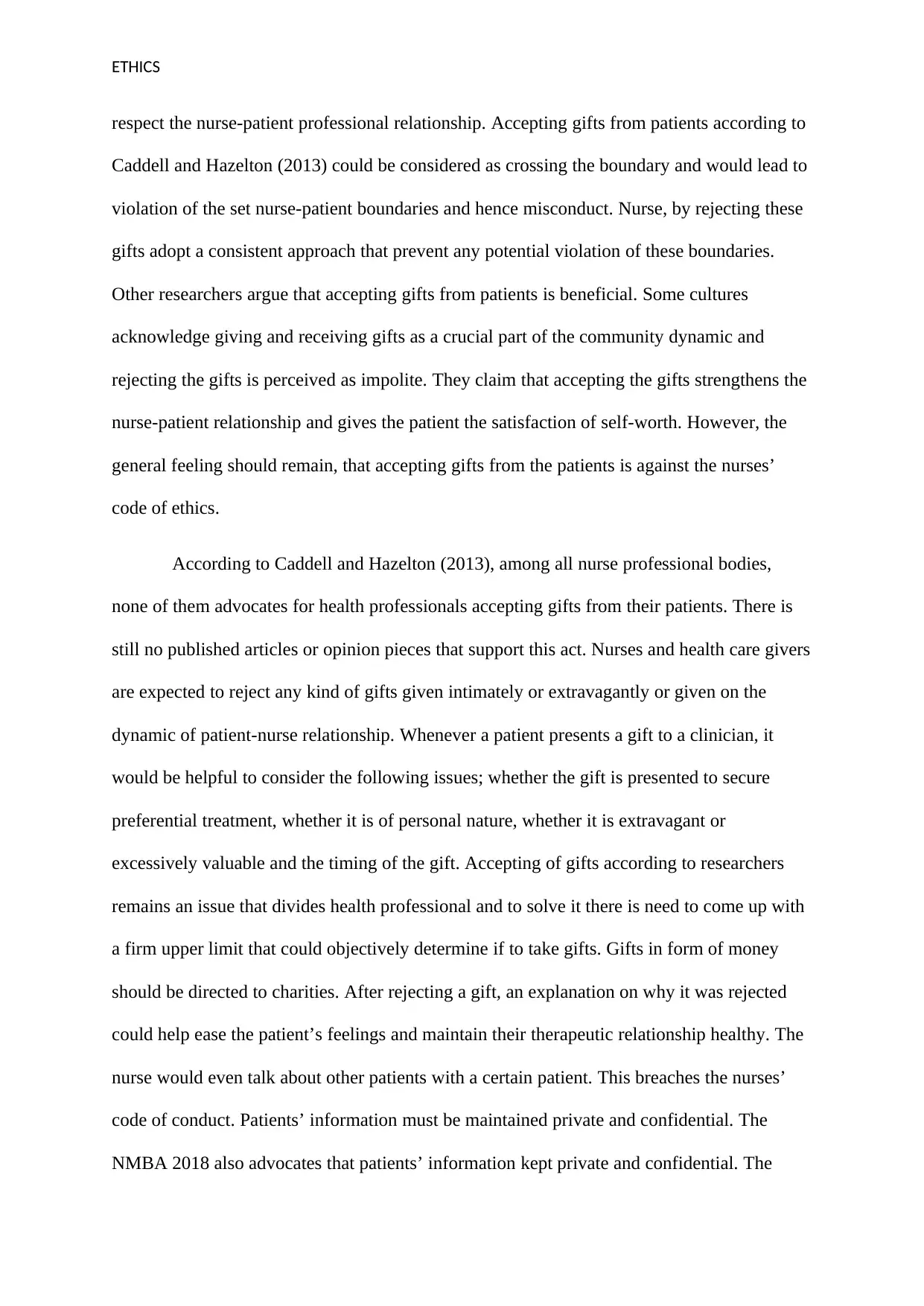
ETHICS
respect the nurse-patient professional relationship. Accepting gifts from patients according to
Caddell and Hazelton (2013) could be considered as crossing the boundary and would lead to
violation of the set nurse-patient boundaries and hence misconduct. Nurse, by rejecting these
gifts adopt a consistent approach that prevent any potential violation of these boundaries.
Other researchers argue that accepting gifts from patients is beneficial. Some cultures
acknowledge giving and receiving gifts as a crucial part of the community dynamic and
rejecting the gifts is perceived as impolite. They claim that accepting the gifts strengthens the
nurse-patient relationship and gives the patient the satisfaction of self-worth. However, the
general feeling should remain, that accepting gifts from the patients is against the nurses’
code of ethics.
According to Caddell and Hazelton (2013), among all nurse professional bodies,
none of them advocates for health professionals accepting gifts from their patients. There is
still no published articles or opinion pieces that support this act. Nurses and health care givers
are expected to reject any kind of gifts given intimately or extravagantly or given on the
dynamic of patient-nurse relationship. Whenever a patient presents a gift to a clinician, it
would be helpful to consider the following issues; whether the gift is presented to secure
preferential treatment, whether it is of personal nature, whether it is extravagant or
excessively valuable and the timing of the gift. Accepting of gifts according to researchers
remains an issue that divides health professional and to solve it there is need to come up with
a firm upper limit that could objectively determine if to take gifts. Gifts in form of money
should be directed to charities. After rejecting a gift, an explanation on why it was rejected
could help ease the patient’s feelings and maintain their therapeutic relationship healthy. The
nurse would even talk about other patients with a certain patient. This breaches the nurses’
code of conduct. Patients’ information must be maintained private and confidential. The
NMBA 2018 also advocates that patients’ information kept private and confidential. The
respect the nurse-patient professional relationship. Accepting gifts from patients according to
Caddell and Hazelton (2013) could be considered as crossing the boundary and would lead to
violation of the set nurse-patient boundaries and hence misconduct. Nurse, by rejecting these
gifts adopt a consistent approach that prevent any potential violation of these boundaries.
Other researchers argue that accepting gifts from patients is beneficial. Some cultures
acknowledge giving and receiving gifts as a crucial part of the community dynamic and
rejecting the gifts is perceived as impolite. They claim that accepting the gifts strengthens the
nurse-patient relationship and gives the patient the satisfaction of self-worth. However, the
general feeling should remain, that accepting gifts from the patients is against the nurses’
code of ethics.
According to Caddell and Hazelton (2013), among all nurse professional bodies,
none of them advocates for health professionals accepting gifts from their patients. There is
still no published articles or opinion pieces that support this act. Nurses and health care givers
are expected to reject any kind of gifts given intimately or extravagantly or given on the
dynamic of patient-nurse relationship. Whenever a patient presents a gift to a clinician, it
would be helpful to consider the following issues; whether the gift is presented to secure
preferential treatment, whether it is of personal nature, whether it is extravagant or
excessively valuable and the timing of the gift. Accepting of gifts according to researchers
remains an issue that divides health professional and to solve it there is need to come up with
a firm upper limit that could objectively determine if to take gifts. Gifts in form of money
should be directed to charities. After rejecting a gift, an explanation on why it was rejected
could help ease the patient’s feelings and maintain their therapeutic relationship healthy. The
nurse would even talk about other patients with a certain patient. This breaches the nurses’
code of conduct. Patients’ information must be maintained private and confidential. The
NMBA 2018 also advocates that patients’ information kept private and confidential. The
Paraphrase This Document
Need a fresh take? Get an instant paraphrase of this document with our AI Paraphraser
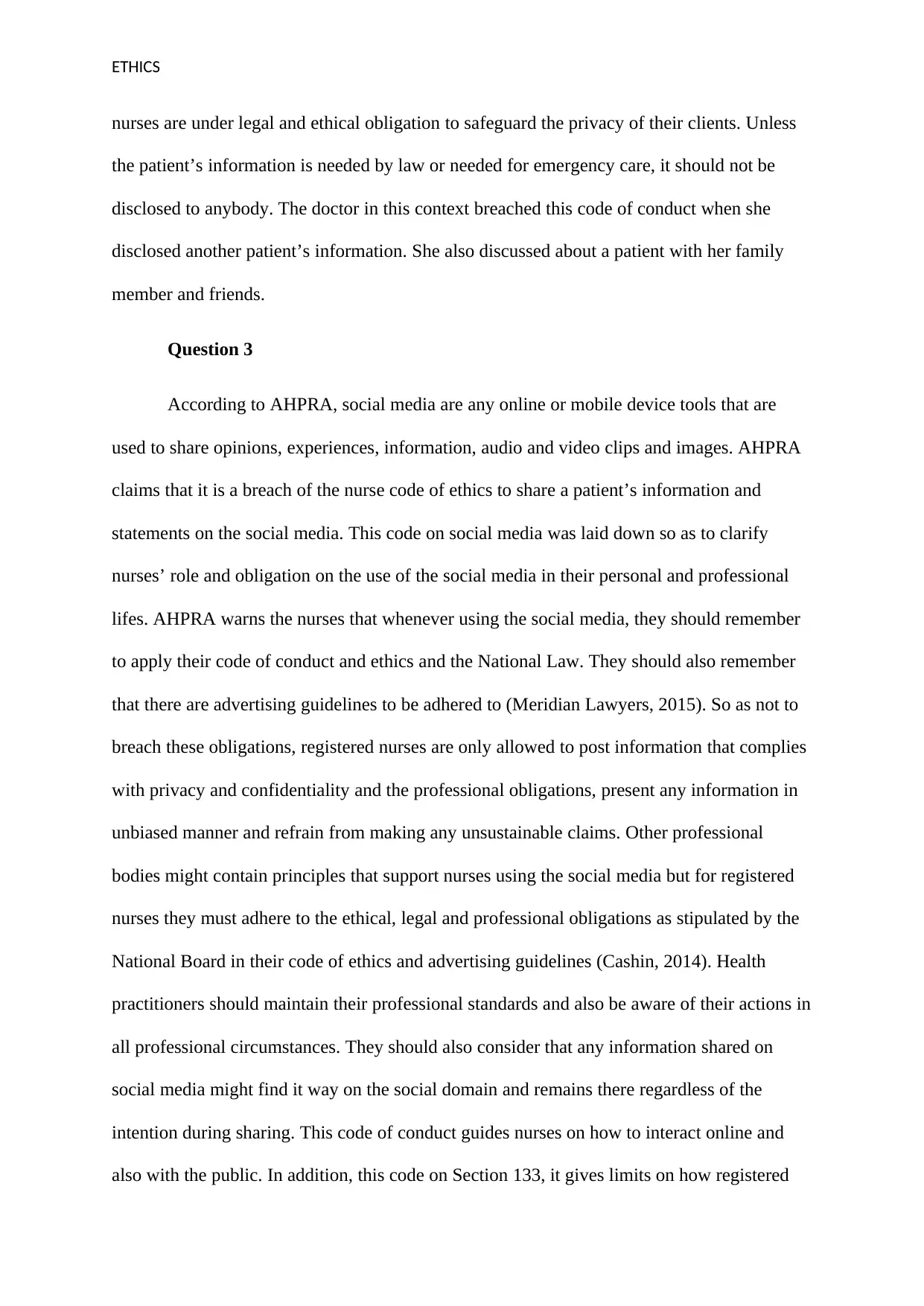
ETHICS
nurses are under legal and ethical obligation to safeguard the privacy of their clients. Unless
the patient’s information is needed by law or needed for emergency care, it should not be
disclosed to anybody. The doctor in this context breached this code of conduct when she
disclosed another patient’s information. She also discussed about a patient with her family
member and friends.
Question 3
According to AHPRA, social media are any online or mobile device tools that are
used to share opinions, experiences, information, audio and video clips and images. AHPRA
claims that it is a breach of the nurse code of ethics to share a patient’s information and
statements on the social media. This code on social media was laid down so as to clarify
nurses’ role and obligation on the use of the social media in their personal and professional
lifes. AHPRA warns the nurses that whenever using the social media, they should remember
to apply their code of conduct and ethics and the National Law. They should also remember
that there are advertising guidelines to be adhered to (Meridian Lawyers, 2015). So as not to
breach these obligations, registered nurses are only allowed to post information that complies
with privacy and confidentiality and the professional obligations, present any information in
unbiased manner and refrain from making any unsustainable claims. Other professional
bodies might contain principles that support nurses using the social media but for registered
nurses they must adhere to the ethical, legal and professional obligations as stipulated by the
National Board in their code of ethics and advertising guidelines (Cashin, 2014). Health
practitioners should maintain their professional standards and also be aware of their actions in
all professional circumstances. They should also consider that any information shared on
social media might find it way on the social domain and remains there regardless of the
intention during sharing. This code of conduct guides nurses on how to interact online and
also with the public. In addition, this code on Section 133, it gives limits on how registered
nurses are under legal and ethical obligation to safeguard the privacy of their clients. Unless
the patient’s information is needed by law or needed for emergency care, it should not be
disclosed to anybody. The doctor in this context breached this code of conduct when she
disclosed another patient’s information. She also discussed about a patient with her family
member and friends.
Question 3
According to AHPRA, social media are any online or mobile device tools that are
used to share opinions, experiences, information, audio and video clips and images. AHPRA
claims that it is a breach of the nurse code of ethics to share a patient’s information and
statements on the social media. This code on social media was laid down so as to clarify
nurses’ role and obligation on the use of the social media in their personal and professional
lifes. AHPRA warns the nurses that whenever using the social media, they should remember
to apply their code of conduct and ethics and the National Law. They should also remember
that there are advertising guidelines to be adhered to (Meridian Lawyers, 2015). So as not to
breach these obligations, registered nurses are only allowed to post information that complies
with privacy and confidentiality and the professional obligations, present any information in
unbiased manner and refrain from making any unsustainable claims. Other professional
bodies might contain principles that support nurses using the social media but for registered
nurses they must adhere to the ethical, legal and professional obligations as stipulated by the
National Board in their code of ethics and advertising guidelines (Cashin, 2014). Health
practitioners should maintain their professional standards and also be aware of their actions in
all professional circumstances. They should also consider that any information shared on
social media might find it way on the social domain and remains there regardless of the
intention during sharing. This code of conduct guides nurses on how to interact online and
also with the public. In addition, this code on Section 133, it gives limits on how registered
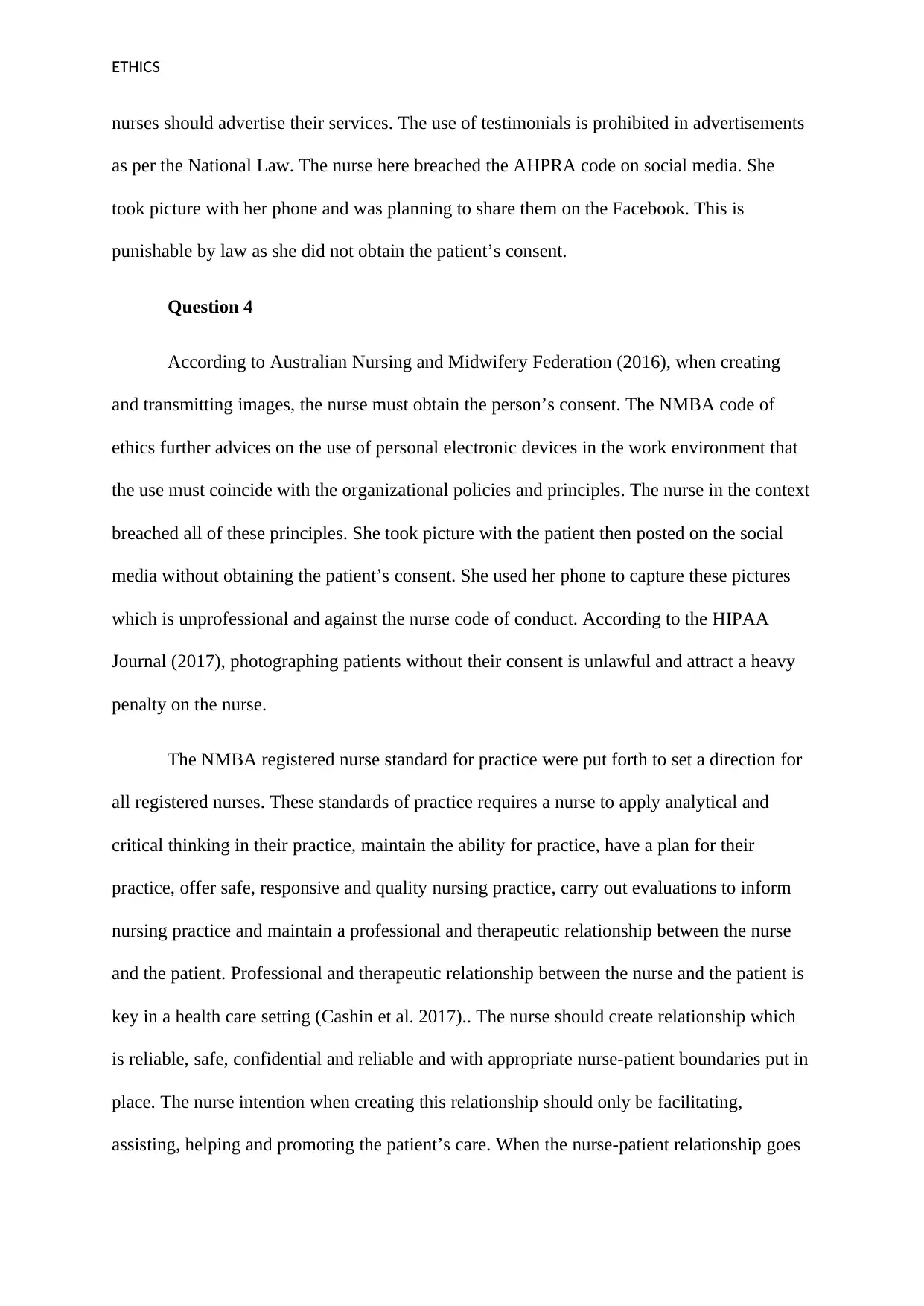
ETHICS
nurses should advertise their services. The use of testimonials is prohibited in advertisements
as per the National Law. The nurse here breached the AHPRA code on social media. She
took picture with her phone and was planning to share them on the Facebook. This is
punishable by law as she did not obtain the patient’s consent.
Question 4
According to Australian Nursing and Midwifery Federation (2016), when creating
and transmitting images, the nurse must obtain the person’s consent. The NMBA code of
ethics further advices on the use of personal electronic devices in the work environment that
the use must coincide with the organizational policies and principles. The nurse in the context
breached all of these principles. She took picture with the patient then posted on the social
media without obtaining the patient’s consent. She used her phone to capture these pictures
which is unprofessional and against the nurse code of conduct. According to the HIPAA
Journal (2017), photographing patients without their consent is unlawful and attract a heavy
penalty on the nurse.
The NMBA registered nurse standard for practice were put forth to set a direction for
all registered nurses. These standards of practice requires a nurse to apply analytical and
critical thinking in their practice, maintain the ability for practice, have a plan for their
practice, offer safe, responsive and quality nursing practice, carry out evaluations to inform
nursing practice and maintain a professional and therapeutic relationship between the nurse
and the patient. Professional and therapeutic relationship between the nurse and the patient is
key in a health care setting (Cashin et al. 2017).. The nurse should create relationship which
is reliable, safe, confidential and reliable and with appropriate nurse-patient boundaries put in
place. The nurse intention when creating this relationship should only be facilitating,
assisting, helping and promoting the patient’s care. When the nurse-patient relationship goes
nurses should advertise their services. The use of testimonials is prohibited in advertisements
as per the National Law. The nurse here breached the AHPRA code on social media. She
took picture with her phone and was planning to share them on the Facebook. This is
punishable by law as she did not obtain the patient’s consent.
Question 4
According to Australian Nursing and Midwifery Federation (2016), when creating
and transmitting images, the nurse must obtain the person’s consent. The NMBA code of
ethics further advices on the use of personal electronic devices in the work environment that
the use must coincide with the organizational policies and principles. The nurse in the context
breached all of these principles. She took picture with the patient then posted on the social
media without obtaining the patient’s consent. She used her phone to capture these pictures
which is unprofessional and against the nurse code of conduct. According to the HIPAA
Journal (2017), photographing patients without their consent is unlawful and attract a heavy
penalty on the nurse.
The NMBA registered nurse standard for practice were put forth to set a direction for
all registered nurses. These standards of practice requires a nurse to apply analytical and
critical thinking in their practice, maintain the ability for practice, have a plan for their
practice, offer safe, responsive and quality nursing practice, carry out evaluations to inform
nursing practice and maintain a professional and therapeutic relationship between the nurse
and the patient. Professional and therapeutic relationship between the nurse and the patient is
key in a health care setting (Cashin et al. 2017).. The nurse should create relationship which
is reliable, safe, confidential and reliable and with appropriate nurse-patient boundaries put in
place. The nurse intention when creating this relationship should only be facilitating,
assisting, helping and promoting the patient’s care. When the nurse-patient relationship goes
⊘ This is a preview!⊘
Do you want full access?
Subscribe today to unlock all pages.

Trusted by 1+ million students worldwide
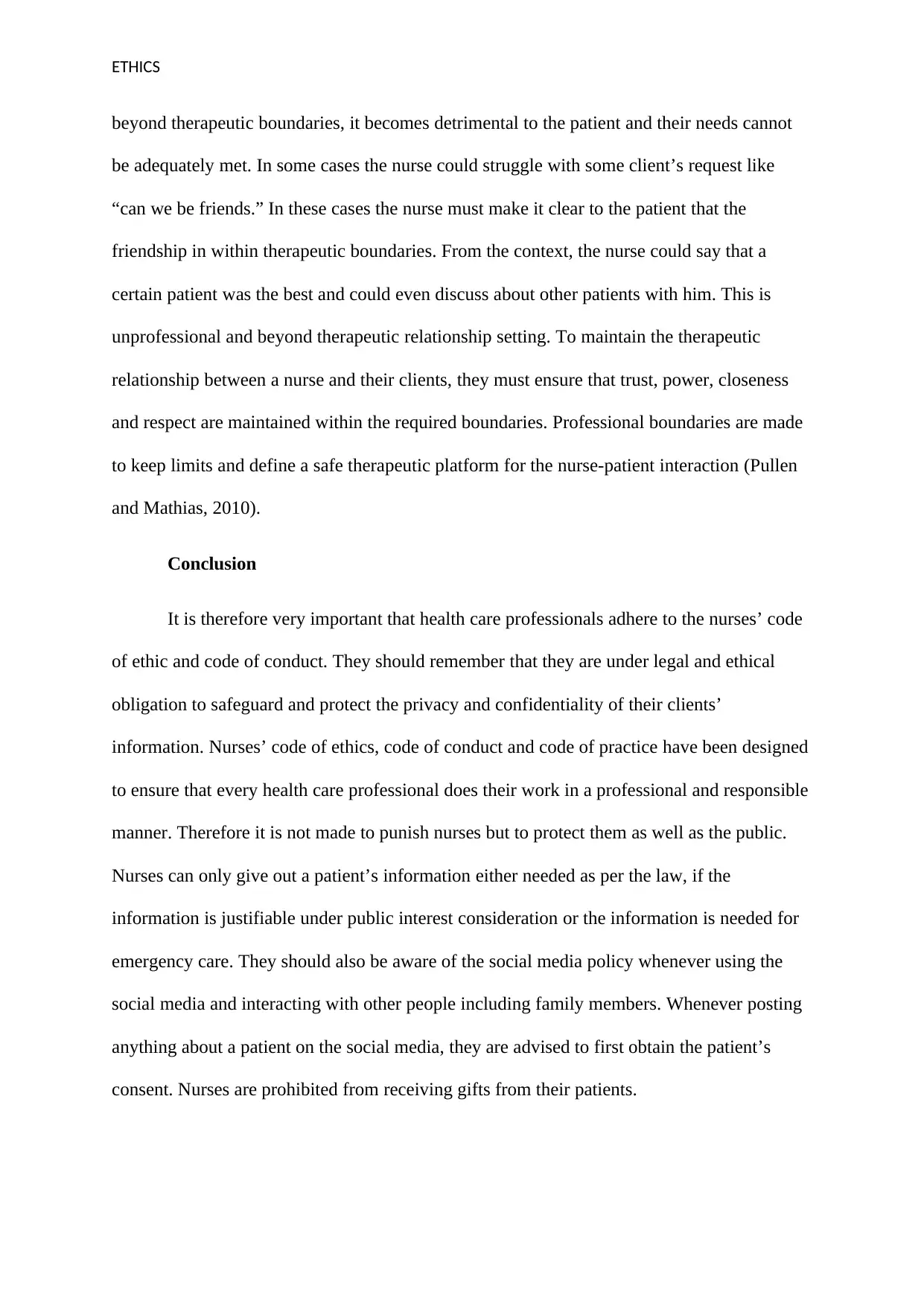
ETHICS
beyond therapeutic boundaries, it becomes detrimental to the patient and their needs cannot
be adequately met. In some cases the nurse could struggle with some client’s request like
“can we be friends.” In these cases the nurse must make it clear to the patient that the
friendship in within therapeutic boundaries. From the context, the nurse could say that a
certain patient was the best and could even discuss about other patients with him. This is
unprofessional and beyond therapeutic relationship setting. To maintain the therapeutic
relationship between a nurse and their clients, they must ensure that trust, power, closeness
and respect are maintained within the required boundaries. Professional boundaries are made
to keep limits and define a safe therapeutic platform for the nurse-patient interaction (Pullen
and Mathias, 2010).
Conclusion
It is therefore very important that health care professionals adhere to the nurses’ code
of ethic and code of conduct. They should remember that they are under legal and ethical
obligation to safeguard and protect the privacy and confidentiality of their clients’
information. Nurses’ code of ethics, code of conduct and code of practice have been designed
to ensure that every health care professional does their work in a professional and responsible
manner. Therefore it is not made to punish nurses but to protect them as well as the public.
Nurses can only give out a patient’s information either needed as per the law, if the
information is justifiable under public interest consideration or the information is needed for
emergency care. They should also be aware of the social media policy whenever using the
social media and interacting with other people including family members. Whenever posting
anything about a patient on the social media, they are advised to first obtain the patient’s
consent. Nurses are prohibited from receiving gifts from their patients.
beyond therapeutic boundaries, it becomes detrimental to the patient and their needs cannot
be adequately met. In some cases the nurse could struggle with some client’s request like
“can we be friends.” In these cases the nurse must make it clear to the patient that the
friendship in within therapeutic boundaries. From the context, the nurse could say that a
certain patient was the best and could even discuss about other patients with him. This is
unprofessional and beyond therapeutic relationship setting. To maintain the therapeutic
relationship between a nurse and their clients, they must ensure that trust, power, closeness
and respect are maintained within the required boundaries. Professional boundaries are made
to keep limits and define a safe therapeutic platform for the nurse-patient interaction (Pullen
and Mathias, 2010).
Conclusion
It is therefore very important that health care professionals adhere to the nurses’ code
of ethic and code of conduct. They should remember that they are under legal and ethical
obligation to safeguard and protect the privacy and confidentiality of their clients’
information. Nurses’ code of ethics, code of conduct and code of practice have been designed
to ensure that every health care professional does their work in a professional and responsible
manner. Therefore it is not made to punish nurses but to protect them as well as the public.
Nurses can only give out a patient’s information either needed as per the law, if the
information is justifiable under public interest consideration or the information is needed for
emergency care. They should also be aware of the social media policy whenever using the
social media and interacting with other people including family members. Whenever posting
anything about a patient on the social media, they are advised to first obtain the patient’s
consent. Nurses are prohibited from receiving gifts from their patients.
Paraphrase This Document
Need a fresh take? Get an instant paraphrase of this document with our AI Paraphraser
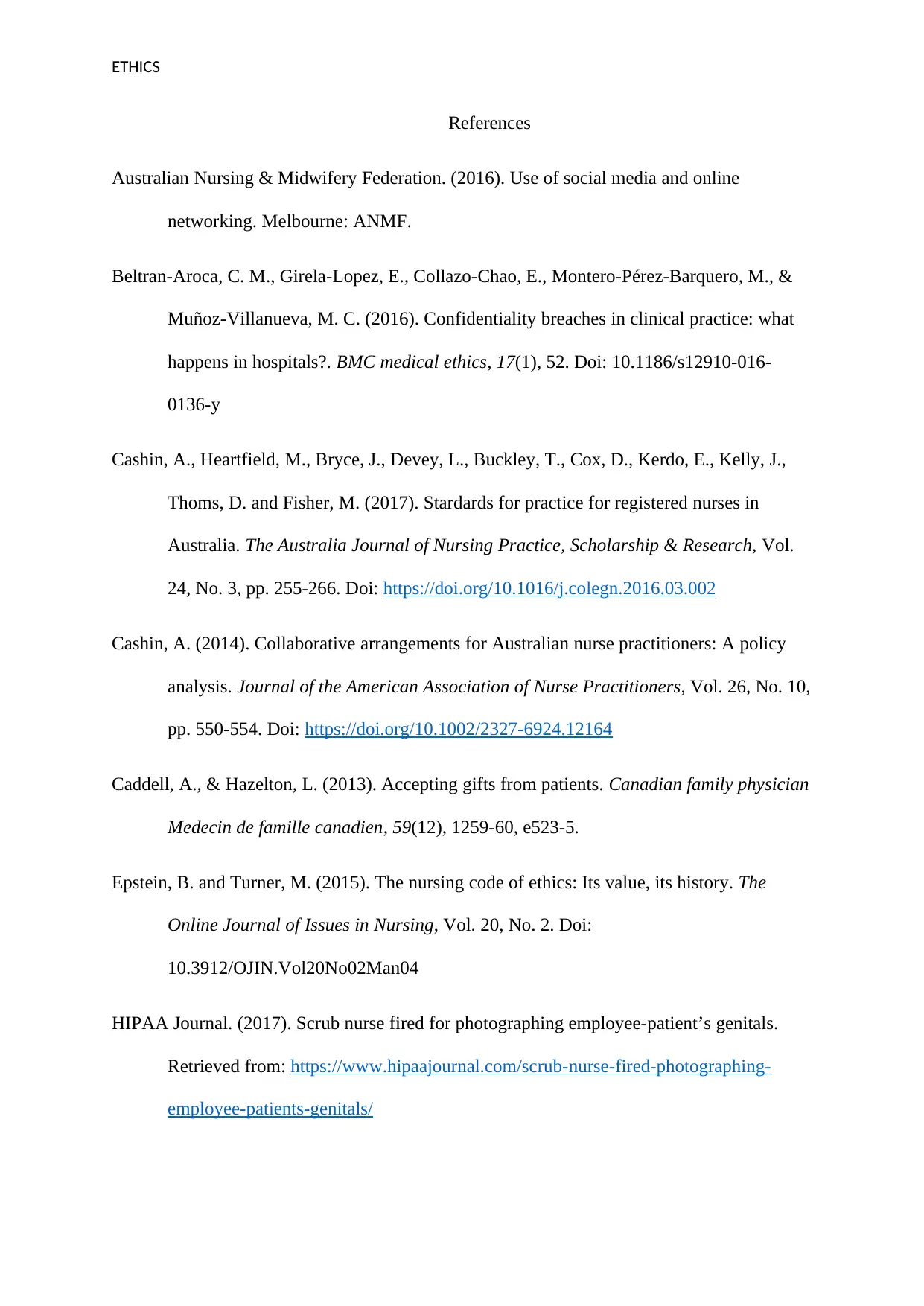
ETHICS
References
Australian Nursing & Midwifery Federation. (2016). Use of social media and online
networking. Melbourne: ANMF.
Beltran-Aroca, C. M., Girela-Lopez, E., Collazo-Chao, E., Montero-Pérez-Barquero, M., &
Muñoz-Villanueva, M. C. (2016). Confidentiality breaches in clinical practice: what
happens in hospitals?. BMC medical ethics, 17(1), 52. Doi: 10.1186/s12910-016-
0136-y
Cashin, A., Heartfield, M., Bryce, J., Devey, L., Buckley, T., Cox, D., Kerdo, E., Kelly, J.,
Thoms, D. and Fisher, M. (2017). Stardards for practice for registered nurses in
Australia. The Australia Journal of Nursing Practice, Scholarship & Research, Vol.
24, No. 3, pp. 255-266. Doi: https://doi.org/10.1016/j.colegn.2016.03.002
Cashin, A. (2014). Collaborative arrangements for Australian nurse practitioners: A policy
analysis. Journal of the American Association of Nurse Practitioners, Vol. 26, No. 10,
pp. 550-554. Doi: https://doi.org/10.1002/2327-6924.12164
Caddell, A., & Hazelton, L. (2013). Accepting gifts from patients. Canadian family physician
Medecin de famille canadien, 59(12), 1259-60, e523-5.
Epstein, B. and Turner, M. (2015). The nursing code of ethics: Its value, its history. The
Online Journal of Issues in Nursing, Vol. 20, No. 2. Doi:
10.3912/OJIN.Vol20No02Man04
HIPAA Journal. (2017). Scrub nurse fired for photographing employee-patient’s genitals.
Retrieved from: https://www.hipaajournal.com/scrub-nurse-fired-photographing-
employee-patients-genitals/
References
Australian Nursing & Midwifery Federation. (2016). Use of social media and online
networking. Melbourne: ANMF.
Beltran-Aroca, C. M., Girela-Lopez, E., Collazo-Chao, E., Montero-Pérez-Barquero, M., &
Muñoz-Villanueva, M. C. (2016). Confidentiality breaches in clinical practice: what
happens in hospitals?. BMC medical ethics, 17(1), 52. Doi: 10.1186/s12910-016-
0136-y
Cashin, A., Heartfield, M., Bryce, J., Devey, L., Buckley, T., Cox, D., Kerdo, E., Kelly, J.,
Thoms, D. and Fisher, M. (2017). Stardards for practice for registered nurses in
Australia. The Australia Journal of Nursing Practice, Scholarship & Research, Vol.
24, No. 3, pp. 255-266. Doi: https://doi.org/10.1016/j.colegn.2016.03.002
Cashin, A. (2014). Collaborative arrangements for Australian nurse practitioners: A policy
analysis. Journal of the American Association of Nurse Practitioners, Vol. 26, No. 10,
pp. 550-554. Doi: https://doi.org/10.1002/2327-6924.12164
Caddell, A., & Hazelton, L. (2013). Accepting gifts from patients. Canadian family physician
Medecin de famille canadien, 59(12), 1259-60, e523-5.
Epstein, B. and Turner, M. (2015). The nursing code of ethics: Its value, its history. The
Online Journal of Issues in Nursing, Vol. 20, No. 2. Doi:
10.3912/OJIN.Vol20No02Man04
HIPAA Journal. (2017). Scrub nurse fired for photographing employee-patient’s genitals.
Retrieved from: https://www.hipaajournal.com/scrub-nurse-fired-photographing-
employee-patients-genitals/
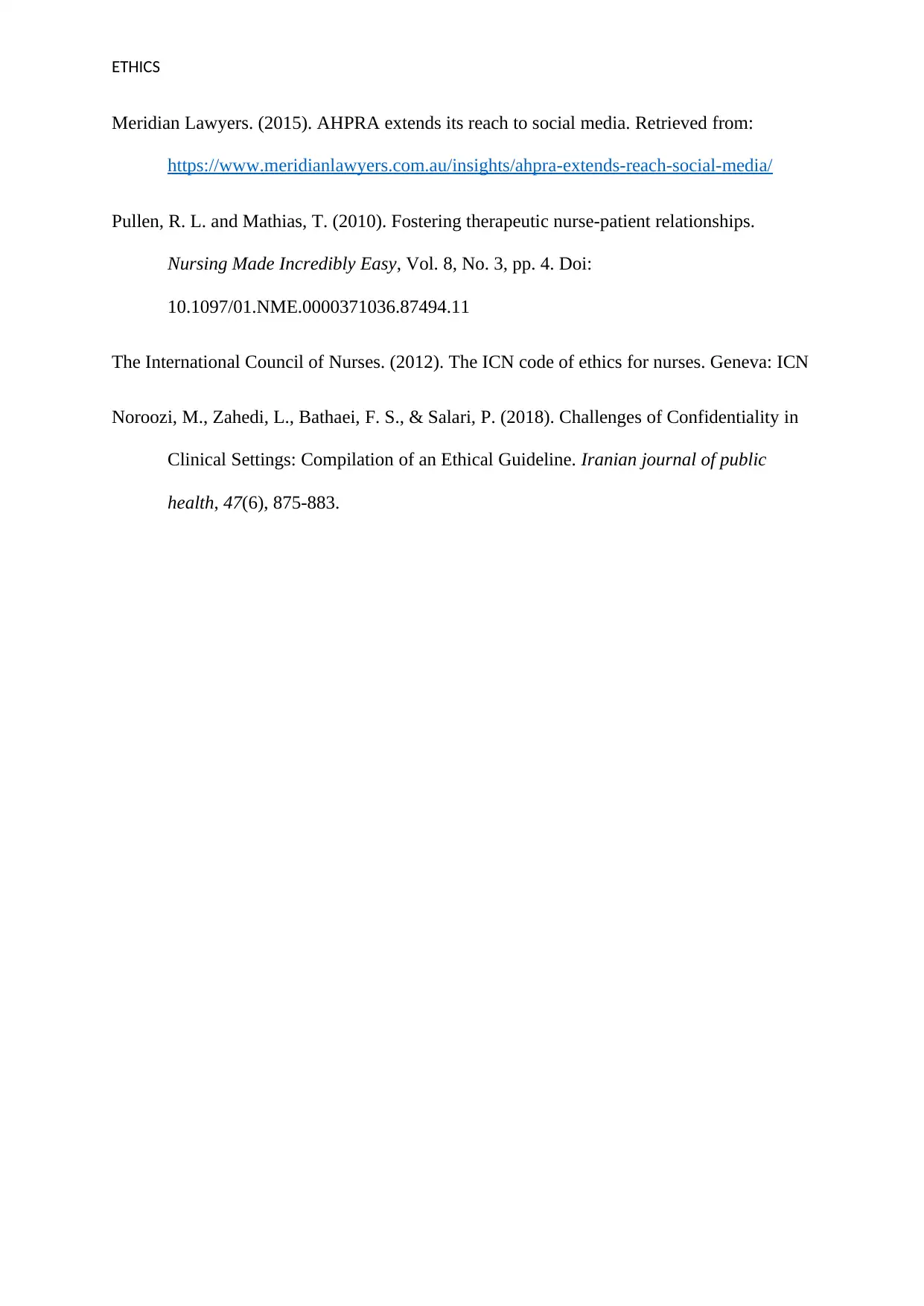
ETHICS
Meridian Lawyers. (2015). AHPRA extends its reach to social media. Retrieved from:
https://www.meridianlawyers.com.au/insights/ahpra-extends-reach-social-media/
Pullen, R. L. and Mathias, T. (2010). Fostering therapeutic nurse-patient relationships.
Nursing Made Incredibly Easy, Vol. 8, No. 3, pp. 4. Doi:
10.1097/01.NME.0000371036.87494.11
The International Council of Nurses. (2012). The ICN code of ethics for nurses. Geneva: ICN
Noroozi, M., Zahedi, L., Bathaei, F. S., & Salari, P. (2018). Challenges of Confidentiality in
Clinical Settings: Compilation of an Ethical Guideline. Iranian journal of public
health, 47(6), 875-883.
Meridian Lawyers. (2015). AHPRA extends its reach to social media. Retrieved from:
https://www.meridianlawyers.com.au/insights/ahpra-extends-reach-social-media/
Pullen, R. L. and Mathias, T. (2010). Fostering therapeutic nurse-patient relationships.
Nursing Made Incredibly Easy, Vol. 8, No. 3, pp. 4. Doi:
10.1097/01.NME.0000371036.87494.11
The International Council of Nurses. (2012). The ICN code of ethics for nurses. Geneva: ICN
Noroozi, M., Zahedi, L., Bathaei, F. S., & Salari, P. (2018). Challenges of Confidentiality in
Clinical Settings: Compilation of an Ethical Guideline. Iranian journal of public
health, 47(6), 875-883.
⊘ This is a preview!⊘
Do you want full access?
Subscribe today to unlock all pages.

Trusted by 1+ million students worldwide
1 out of 9
Related Documents
Your All-in-One AI-Powered Toolkit for Academic Success.
+13062052269
info@desklib.com
Available 24*7 on WhatsApp / Email
![[object Object]](/_next/static/media/star-bottom.7253800d.svg)
Unlock your academic potential
Copyright © 2020–2026 A2Z Services. All Rights Reserved. Developed and managed by ZUCOL.





